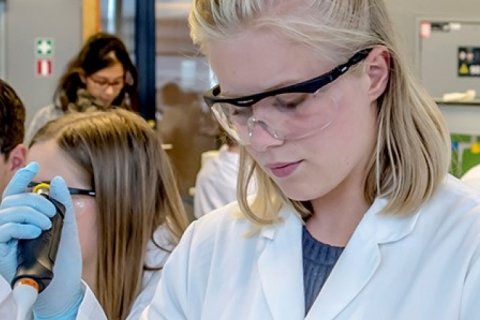MBLS: the successful new Bachelor’s programme
Molecular and Biophysical Life Sciences (MBLS) is the Faculty of Science’s new English-language Bachelor’s study programme. A total of 69 students enrolled in the programme in academic year 2021-2022, and this year there were twice as many enrolments. We spoke with Study Programme Manager Bertrand Kleizen and Programme Director Eric Huizinga about the new programme’s success, and its tangible consequences.

MBLS is an inter-disciplinary Bachelor’s programme that combines the perspectives of Biology, Chemistry, Pharmaceutical Sciences and Physics. Interested students must therefore have a broad orientation in the exact sciences. Bertrand: “We start with a broad overview of cell biology, followed by specific knowledge of mathematics and programming, which serves as the foundation for the subsequent courses. Then we zoom in on organic and physical chemistry and biochemistry, before zooming out again to examine biological and physical systems. I like to use the metaphor of playing the accordion. That’s how you could describe the content, and in fact all facets of the Life Sciences, within MBLS.”
English as fuel for growth
The fact that the Bachelor’s programme is offered in English is an important explanation for the large number of enrolments. This academic year, half of the 143 students who started on the programme came from abroad. Kleizen: “We’ve noticed that the growth is truly due to the fact that we’re an international programme. The growth is in the number of international enrolments, and not as much among the Dutch students.” Before the summer holidays, foreign students submitted 450 complete applications. Huizinga: “That was amazing. So it’s always exciting to see how many students actually start in September. We try to make a good estimate of the number of starting students in advance, but we’re always in suspense until they show up in the lecture hall for the kick-off of the new academic year.”
We’ve noticed that the growth is truly due to the fact that we’re an international programme.
We should note that MBLS has relatively strict admission requirements, which explains the difference between the number of applications and the actual student enrolments. Not every application meets the requirements for admission. Kleizen: “Our prerequisites include Mathematics B, Chemistry, Physics and Biology at the university preparatory education level. In the Netherlands, that means a double VWO profile in Nature & Technology (NT) and Nature & Health (NH), but there isn’t always a foreign equivalent for that profile.” Nevertheless, international students who lack one or more prerequisites may still start on the programme. Some students are highly motivated and earn one or more university preparatory education certificates during the summer holidays, which makes them eligible to meet the admission requirements. So the moment of truth comes in early September. Are the preliminary estimates accurate, and if not, can the programme accommodate all the new students?
Speaking of accommodations; MBLS feels that 150 students is the absolute maximum in order to offer quality, varied hands-on education during the first (and compulsory) phase of the study programme. One of the programme priorities is that it does not sacrifice lab practicals, which are offered in four of the ten required courses. Huizinga also emphasises that MBLS promotes itself as a research-connected study programme. That is reflected in the final project, where the student comes into contact with the day-to-day practice of scientific research. Bertrand: “The larger the study programme, the more difficult it is to offer lab practicals, because there just isn’t enough lab capacity. So with 143 enrolments for academic year 2022-2023, MBLS is doing just right.”
Effort and future
The dramatic increase in student enrolments is an excellent result. But how do you ensure that the international classroom is actually successful?” Kleizen: ‘Community; that’s the key to our success.” The tutorials, lectures and online learning environment are all in English, and even the Dutch students speak English. “You want the groups to mix together, and that even the chats at the coffee machine and all the student jokes are in English.” “We have a fantastic group and we put a lot of effort into the community.” The introduction weeks also play a major role. With more than 100 registrations for the introduction camp – made possible by our introduction committee and the board of U.L.S.V. Amino (the MBLS student association) – the introduction period was an excellent start to the new year.
Our main goal is to offer our students an excellent study programme.
Huizinga: “Our main goal is to offer our students an excellent study programme. I’m very pleased with all of the effort by our scientists and the lecturer community. Their commitment has been amazing. It also provides an excellent impulse. We sometimes have to clear some inter-departmental hurdles, but when the students really connect with the study programme, it feels like a reward for everyone’s hard work.”
Kleizen concludes: “We want the students to be satisfied. If that starts to crack, then you’re shooting yourself in the foot. They have to have a good feeling after graduation, and they need to be ready for the next step in their educational and professional careers. In the end, they serve as our ambassadors. If we can guarantee that, then we won’t need to worry about registrations for next year.” Both gentlemen then close with the words: “It’ll be another exciting time.”

